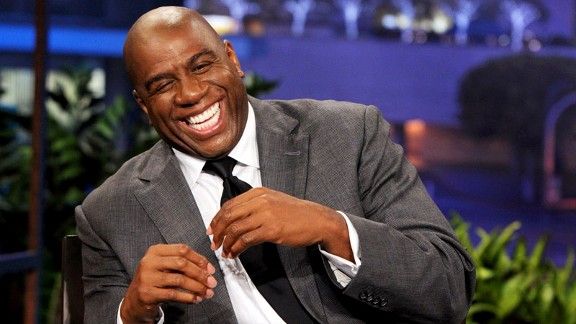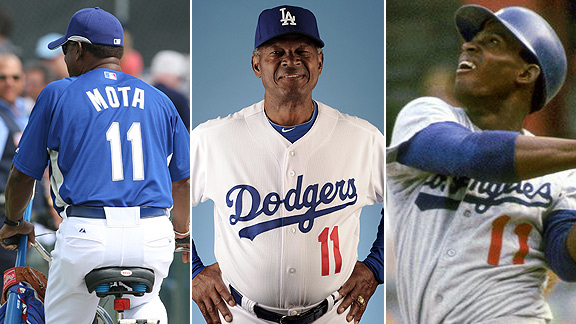A bundle of clickable goodness today …
- Andre Ethier had some interesting comments in an interview Tuesday with ESPN AM 710.
… Asked about wanting to be with the Dodgers long-term, Ethier said, “It comes down to the security part, too, but it also comes down to unfinished business and I feel like, yeah, I’m facing that decision now where hopefully it doesn’t come down to me having to leave and [I can] be a part of this team when we start rebounding and getting back to where we need to be.”The ownership limbo seemingly affected the Dodgers’ ability to deal in free agency this offseason, with general manager Ned Colletti saying earlier this month the team was essentially done with its offseason acquisitions because “we’re at our payroll.” So when news broke Tuesday of the Detroit Tigers nearing a deal with marquee free agent Prince Fielder, it wasn’t lost on Ethier.
“Why can’t the Dodgers be doing that? Look at the markets those two teams are, and the stability you see through the front office and the team being able to operate … on the level it should be,” he said, adding, “you don’t try to think of it too much as a player, but obviously if you’re not going after the big fish like other teams are, like our partners are down there to the south of us, the Angels [who acquired Albert Pujols], it’s tough to go out there and keep competing year after year if you’re not going out there and making your team better every year. “I think that’s the situation we’ve been in. Obviously it’s going to get better from here on out because of the sell and getting new people in there.”
Ethier, who hit .292 with 11 home runs and 62 RBIs in 2011 before ending the season with a right knee injury, said he’s aiming for a “strong, solid” 2012.
“I’ve kind of dealt with this knee thing for the past two years, put it off for one off-season and then last season it just became a thing where a lot of things started multiplying and getting worse and something where I couldn’t quite get back my swing … It was very frustrating and I learned a lot from that.”
- Ethier participated in a prank on Dustin Pedroia for a Boston radio station. Roberto Baly of Vin Scully Is My Homeboy has more.
- Matt Kemp’s new contract looks even more valuable in the wake of the Prince Fielder signing, writes Mike Petriello of Mike Scioscia’s Tragic Illness.
- Tim Brown of Yahoo! Sports offers up a wintertime preview of their 19th-ranked MLB team, the 2012 Dodgers.
- Former Dodger co-owner and managing partner Bob Daly had even more to say Tuesday (in an interview with T.J. Simers of the Times) than Ethier. Daly is highly critical of Frank McCourt, critical of the Dodgers’ offseason signings and critical of himself for not trading prospects for a bat in the middle of the 2002 season — though I would say that was a period in which the Dodgers didn’t have a whole lot of trade value in the system.
- Steve Dilbeck of the Times wonders if the potential interest of St. Louis Rams owner Stan Kroenke in buying the Dodgers could be the first domino that leads to Frank McCourt becoming an NFL minority owner.
- In a separate post, Dilbeck also offers why the Dodgers might win the National League West, despite all their uncertainty.
- Just when I think I can’t read any more Hall of Fame voting insight, here comes Lewie Pollis of Behind the Boxscore with a new take, about what he calls “a mistaken assumption about the balloting process: that writers’ own observations of players were expected to be primary factors in their votes.”
- Daryle Ward, who infamously batted .183 and slugged .193 at age 28 for the 2003 Dodgers, received a 50-game suspension from MLB for testing positive for a banned amphetamine. Ward, who has a .768 lifetime OPS, hasn’t played in the majors since 2008.
- Former Dodger infielder Wilson Valdez, who ended up the winning pitcher for the Phillies over the Reds in a 19-inning game last May, was traded to the Reds today.
- There’s speculation about whether Patrick Soon-Shiong, who owns 4.5 percent of the Lakers, will get involved with a Dodger ownership bid, such as Magic Johnson’s. Bill Shaikin of the Times addresses it today. Soon-Shiong bought Johnson’s share of the Lakers in 2010. Arash Markazi of ESPNLosAngeles.com interviewed Soon-Shiong in November.
- The Left Field Pavilion blog has invited all prospective Dodger owners to come out to the Dodger blogs softball tournament February 11 and “meet the bloggers and fans of the team you are trying to purchase.”
- Cuban outfielder Yoenis Cespedes, 26, is about to become a free agent that MLB teams can bid on. More on Cespedes at Baseball America. The Dodgers are not rumored to be pursuing him. “Projections based off his Cuban numbers show a good but not great hitter with 25-homer power and poor strike-zone control,” writes Aaron Gleeman of Hardball Talk.
- Sam Miller of the Orange County Register is quickly emerging as a baseball writer of the highest order. He has two new freelance pieces: an account of Scott Boras’ beginnings as an agent for Baseball Prospectus, and a pitch-by-pitch account of how the Angels signed Albert Pujols and C.J. Wilson for ESPN the Magazine.
- Kevin Kaduk at Yahoo! Sports blogs about a law in Florida “that any ballpark or stadium that receives taxpayer money shall serve as a homeless shelter on the dates that it is not in use.”





